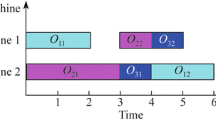Abstract
Genetic algorithms (GAs) are a class of effective parallel searching algorithms inspired by the idea of “survival of the fittest”, which has been successfully applied to a variety of problems, especially in the fields of manufacturing and scheduling. However, it is reported that traditional GAs often suffer from the weaknesses of premature convergence as well as parameter and operator dependence. So far, many improved methods with adaptive parameters or hybrid structures have been proposed, but there is little literature considering the adaptive control of genetic operators. In this paper, an adaptive GA (AGA) with multiple operators is proposed for flowshop scheduling, which is a typical NP-hard optimisation problem with many industrial applications and has been widely studied in both academic and engineering fields. In AGA, multiple different genetic operators are employed in an adaptive hybrid way to enhance the exploration and exploitation abilities so as to prevent premature convergence and achieve superior performance. It especially important to stress that the utilising ratio of each operator for hybridisation is adaptively and dynamically controlled during the evolutionary searching process. Simulation results based on benchmarks demonstrate the effectiveness of AGA by contrast with traditional GAs. And the effect of the adaptive control of the operator and the effects of some parameters on the optimisation performance are discussed as well.
Similar content being viewed by others
References
Garey MR, Johnson DS (1979) Computers and intractability: a guide to the theory of NP-completeness. Freeman, San Francisco
Pinedo M (1995) Scheduling theory, algorithms, and systems. Prentice-Hall, New York
Baker KR. Introduction to sequencing and scheduling. Wiley, New York
Nawaz M, Enscore E, Ham I (1983) A heuristic algorithm for the m-machine, n-job flow-shop sequencing problem. Omega 11(1):91–95
Koulamas C (1998) A new constructive heuristic for the flowshop scheduling problem. Eur J Oper Res 105:66–71
Ogbu FA, Smith DK (1990) The application of the simulated annealing algorithm to the solution of the n/m/Cmax flowshop problem. Comput Oper Res 17(3):243–253
Reeves CR (1995) A genetic algorithm for flowshop sequencing. Comput Oper Res 22(1):5–13
Wang L, Zhang L, Zheng DZ (2003) A class of order-based genetic algorithm for flowshop scheduling. Int J Adv Manuf Technol 22(11–12):828–835
Iyer SK, Saxenab B (2004) Improved genetic algorithm for the permutation flowshop scheduling problem. Comput Oper Res 31:593–606
Nowicki E, Smutnicki C (1996) A fast tabu search algorithm for the permutation flow-shop problem. Eur J Oper Res 91:160–175
Wang L, Zheng DZ (2003) A modified evolutionary programming for flowshop scheduling. Int J Adv Manuf Technol 22(7–8):522–527
Ying KC, Liao CJ (2004) An ant colony system for permutation flow-shop sequencing. Comput Oper Res 31:791–801
Wang L, Zheng DZ (2003) An effective hybrid heuristic for flowshop scheduling. Int J Adv Manuf Technol 21(1):38–44
Wang L (2001) Intelligent optimization with applications. Tsinghua University Press, Beijing
Michalewicz Z (1996) Genetic algorithms + data structures = evolution programs, 3rd edn. Springer, Berlin Heidelberg New York
Eiben AE, Hinterding R, Michalewicz Z (1999) Parameter control in evolutionary algorithms. IEEE Trans Evol Comput 3(2):124–141
Wang L, Zheng DZ (2001) An effective hybrid optimization strategy for job-shop scheduling problems. Comput Oper Res 28(6):585–596
Grefenstette JJ (1986) Optimization of control parameters for genetic algorithms. IEEE Trans Syst Man Cybern 16(1):122–128
Wang L, Zhang L, Zheng DZ (2004) The Ordinal optimisation of genetic control parameters for flowshop scheduling. Int J Adv Manuf Technol 23(11–12):812–819
Coello CCA (2000) Use of a self-adaptive penalty approach for engineering optimization problems. Comput Ind 41:113–127
Lee LH, Fan YL (2002) An adaptive real-coded genetic algorithm. Appl Artif Intell 46:457–486
Hong TP, Wang HS, Chen WC (2002) Simultaneously applying multiple mutation operators in genetic algorithms. J Heuristic 6:439–455
Croce FD, Tadei R, Volta G (1995) A genetic algorithm for the job shop problem. Comput Oper Res 22(1):15–24
Goldberg DE (1989) Genetic algorithms in search, optimization and machine learning, Addison-Wesley, Boston
Bac FQ, Perov VL (1993) New evolutionary genetic algorithms for NP-complete combinatorial optimization problems. Biological Cybern 69:229–234
Carlier J (1978) Ordonnancements a contraintes disjonctives. RAIRO Recherche operationelle/Oper Res 12:333–351
Author information
Authors and Affiliations
Corresponding author
Rights and permissions
About this article
Cite this article
Zhang, L., Wang, L. & Zheng, DZ. An adaptive genetic algorithm with multiple operators for flowshop scheduling. Int J Adv Manuf Technol 27, 580–587 (2006). https://doi.org/10.1007/s00170-004-2223-3
Received:
Accepted:
Published:
Issue Date:
DOI: https://doi.org/10.1007/s00170-004-2223-3




